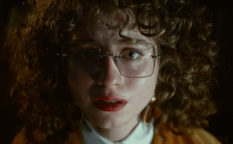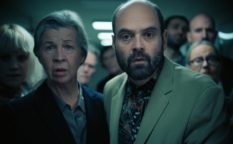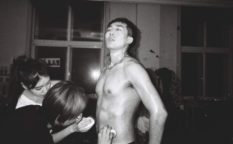Review: Bloody Nose, Empty Pockets (2020)
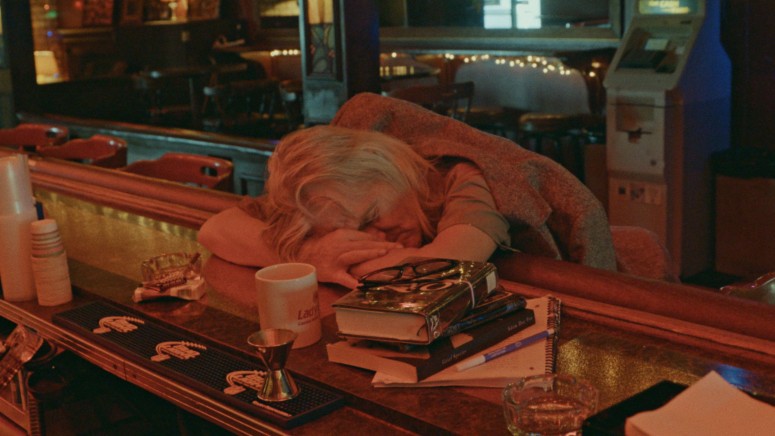
Ever since they quit their daily jobs to start making movies, Bill Ross and Turner Ross have been pushing the envelope with their singular documentary style. In their debut 45365 (2009), which was named after the zip code of Sidney in Ohio, they portrayed their hometown with such attention to its people that the documentary took over the shape of a dynamic fiction film. With their sixth feature length movie Bloody Nose, Empty Pockets that has previously stirred quite a controversy at Sundance, they went a step further in arranging the bits to fit their idea of documentary.
A Las Vegas bar with the nostalgic name “Roaring 20s” is about to close its doors permanently, and the owner is throwing a closing party for her regulars. During the 20 hour long shindig, the booze is downed, the cigarettes chain-smoked, the joints are being rolled and many thoughts about diverse matters exchanged. And although the film was shot the day after Donald Trump was appointed the new president, that topic is largely avoided and more or less pushed in the background through the images shown on the television.
Brothers Ross concentrate exclusively on people and their spontaneously running conversations in the wild party they were responsible for. In real life, only few of the guests knew each other, and some of them have never set their foot in that particular bar before. And some have been friends all their lives. This is something the viewer isn’t aware of (unless told) and the connection between people in the film comes across as genuine. Another small trickery is the occasion for wild boozing, as the bar actually still operates, although it’s not based in Las Vegas, but in New Orleans where the Ross brothers currently reside.
The “regulars” gathered in the “Roaring 20s” couldn’t have been invented by a scriptwriter. Each one of them recreates their own life, they use their own wording and react in a spontaneous way, relaxed by drinking. With every sip of alcohol, the conversations become more emotional, and in some cases aggressive or classically – sexual. Picked up by the directors at diverse spots, men and women seen in the film represent the generation of dive bar topers who seek refuge from the outside world by spending the little money they got on beer. There is a touch of nostalgia in the portrait painted by the directors, and their genuine interest in people gathered in the bar is noticeable. Nostalgic are also the opening credits with thick yellow letters framed black and the yellow tinted photography applied to show the few outdoor scenes as a reminder that there is also the real world out there – dusty, hot and cruel.
Bloody Nose, Empty Pockets draws its strength from the authenticity of all protagonists. While younger ones still look their age, the 40+ generation bares the visible signs of extensive drinking and smoking, and it’s king is called Michael (a former actor Michael Martin). As much as he stands for all barflies whose intellectual potential wasn’t killed by boozing, he is also someone who will advise you against such kind of life. Even though he does say at one point that he’s proud of not becoming an alcoholic before he failed, but after, Michael does eventually crack down in one of the most emotional scenes in the film.
The film is chapterized, but this little written interventions are very discrete although meaningful for the key characters or events in the bar. “You can’t Kill the Bad Grass” is just one of them and dedicated to Pam, one of the few women in the film.
Bloody Nose, Empty Pockets is one of the films you won’t forget. After Sundance, it was screened in the Panorama section of the Berlinale Film Festival.
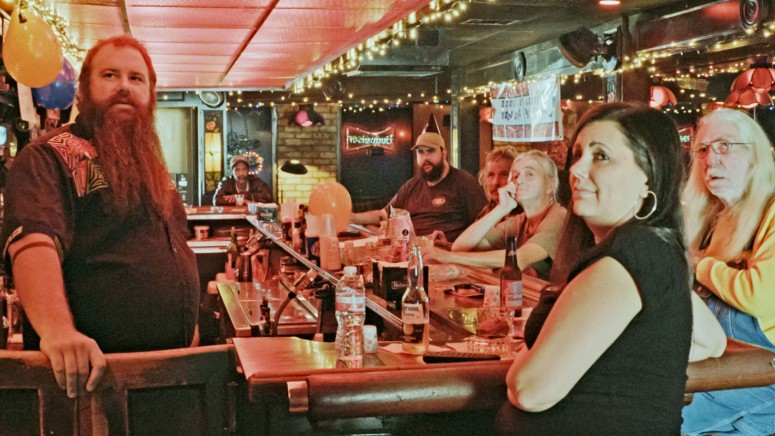
©Department of Motion Picture
Original Title: Bloody Nose, Empty Pockets
Country: USA
Language: English
Runtime: 98 min.
Directed/ Produced/ Photographed by: Bill Ross IV & Turner Ross
Produced by: Michael Gottwald and Chere Theriot
Executive Producers: Davis Guggenheim. Jonathan Silberberg, Nicole Stott
Executive Producer: Matt Sargeant
Original Score: Casey Wayne McAllister
Re-recording Mixer: Tom Effiger, Red Hook Post
Production Sound Mixer: Kyle Sheehan
Sound Advisor: Lawrence Everson
Music Supervisor: Rachel Sipser
Colorist: Bossi Baker
Titles: Markus Rutledge
Visual Effects: Josiah Howison, Markus Rutledge
Editor: Bill Ross IV









